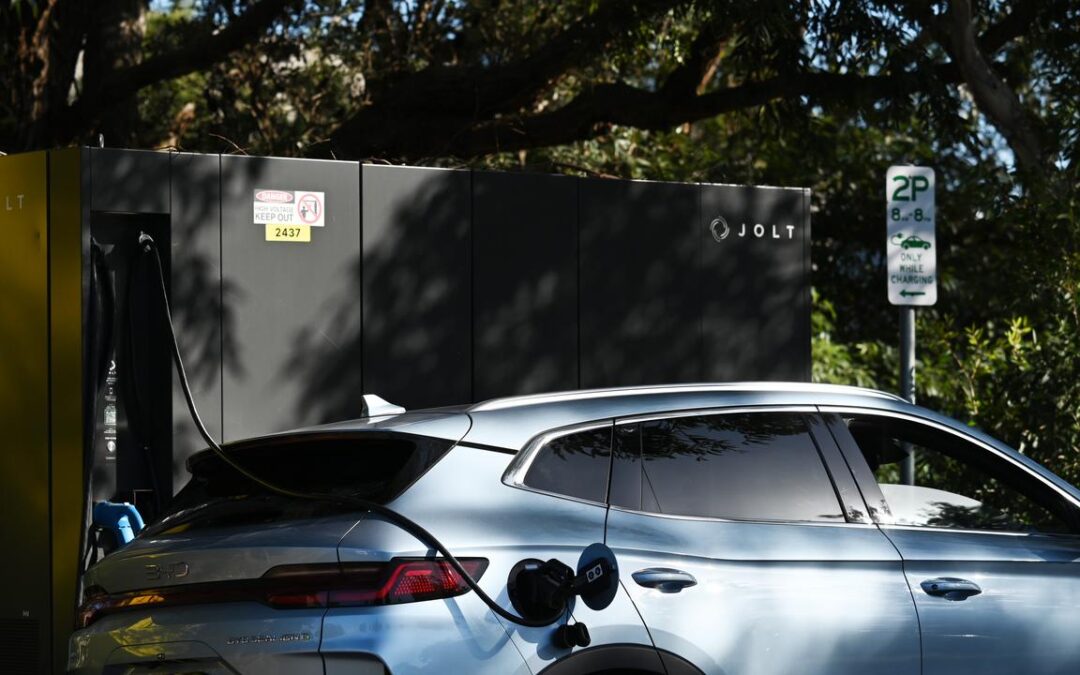
‘Don’t slam brakes on EVs’: sparks fly over fee push
Motorists could face distance-based fees to drive on Australian roads as part of a proposed tax change expected to be on the menu of Treasurer Jim Chalmers’ economic roundtable.
Momentum is building for a road user charge, seen by one federal frontbencher as a “sensible” solution to fund road maintenance as more people switch to electric vehicles.
But EV owners are urging the government not to slow the transition from internal combustion.
The tax change was flagged by the treasurer during a speech in June, saying he was working with the states and territories “on the future of road-user charging” for EVs.
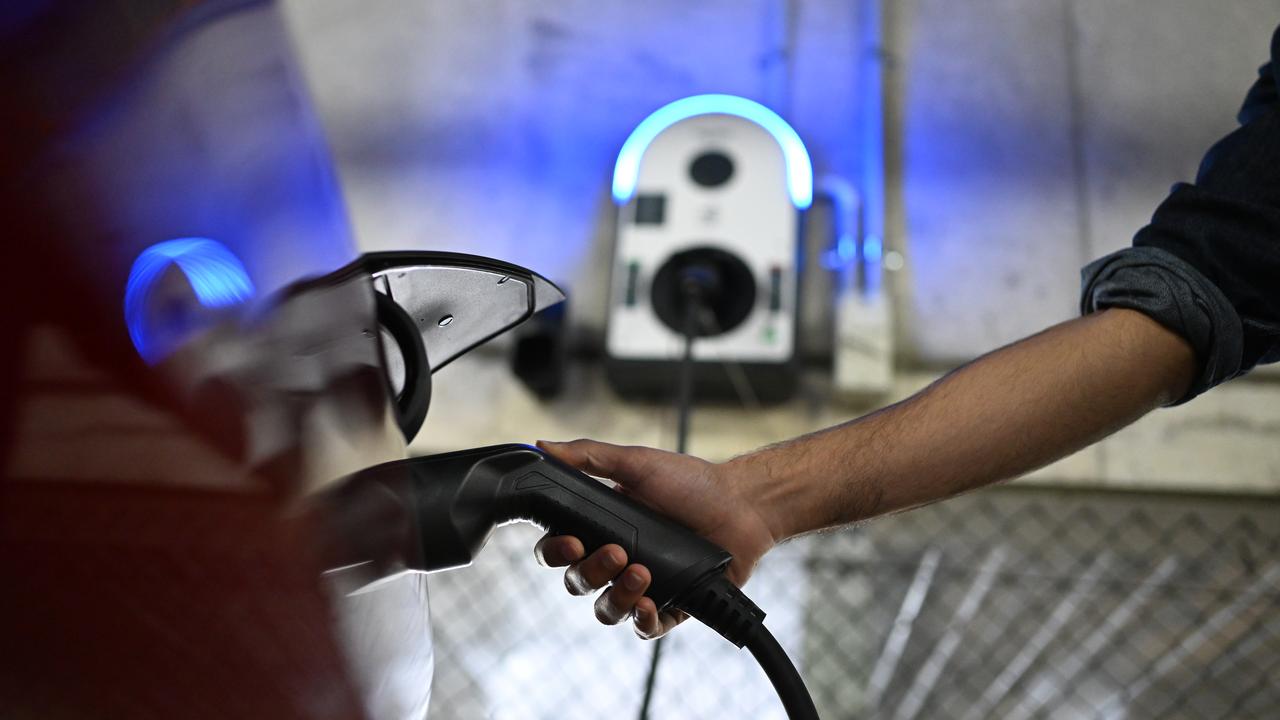
A group of transport industry leaders, convened by Infrastructure Partnerships Australia, met on Monday to discuss a preferred model for a road user charge.
Roads Australia chief executive Ehssan Veiszadeh attended the meeting and said without changes, Australia risked falling short on the infrastructure needed to support its growing population and economy.
Money collected as part of the fuel excise is allocated for fixing roads, but concerns have been raised there will be less set aside in coming years as the number of EVs increases.
“Without reform, we risk a future where our roads are underfunded, unsafe, and unable to support the demands of a growing population,” Mr Veiszadeh said.
No public recommendations were released from the meeting but the infrastructure partnerships group will use the discussion as the basis for a briefing to Treasury before next week’s roundtable.
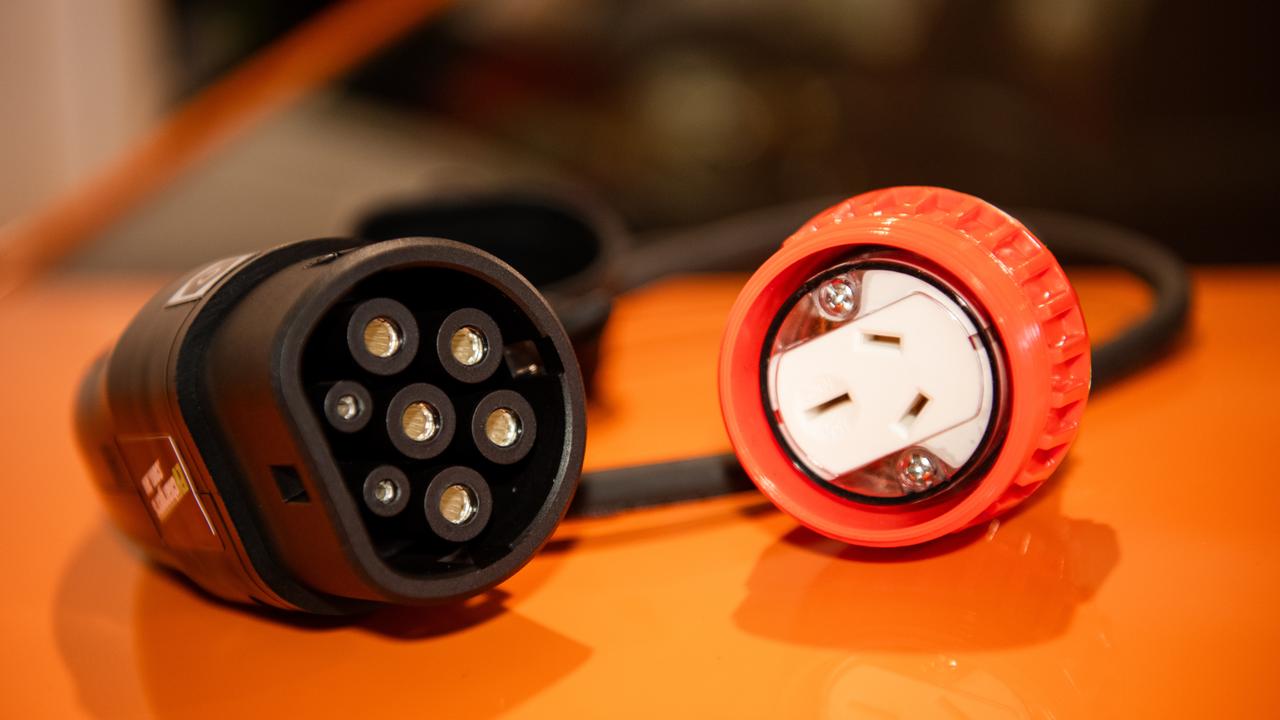
The government had an opportunity to promote EV uptake by using the revenue generated from a road user charge to roll out charging infrastructure, Infrastructure Partnerships Australia chief executive Adrian Dwyer said.
“The primary impediment to the greater uptake of electric vehicles is range anxiety – we can kill two birds with one stone by future-proofing our funding system and paying for the charging network that will drive EV uptake,” he said.
While the federal government has maintained the issue is for states and territories, frontbencher Tanya Plibersek said the idea of a tax for EV users made sense.
“I don’t think anything’s happening tomorrow, but I do think it’s sensible … for the states and territories, to look long term at what they do, to make sure that there’s enough money to build the roads that people want to drive on,” she told Seven’s Sunrise program.
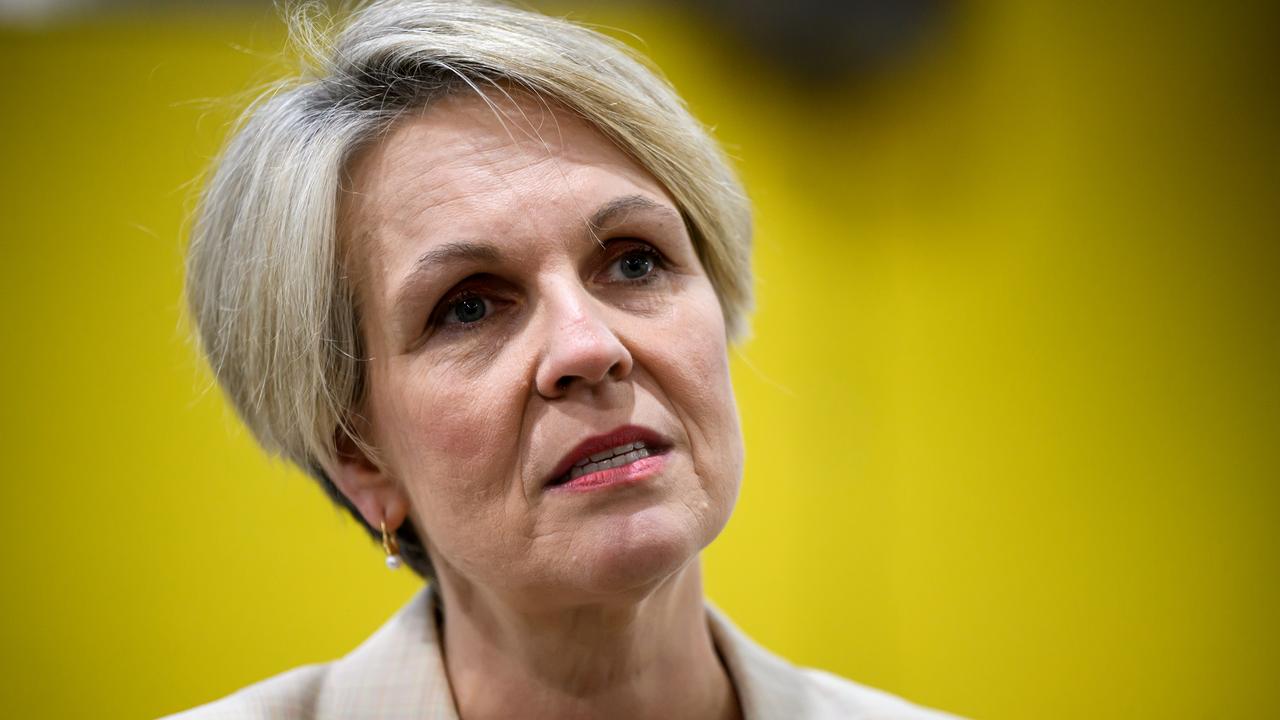
Victoria tried to put in place a two cent per kilometre charge on EV users in 2023, but the proposal was overruled by the High Court, effectively banning states from implementing a road user charge and leaving the issue in the lap of the Commonwealth.
NSW has assumed one will eventually be implemented regardless. In its latest budget, the state’s treasurer, Daniel Mookhey, forecast a road user charge kicking in by 2027/28, which is estimated to bring in $73 million.
New Zealand has a road user charge scheme for EVs based on vehicle weight and distance driven.
Last week the NZ government announced petrol cars would also have to pay the charge, while its fuel excise would be scrapped.

EV owners group the Australian Electric Vehicle Association said any road user charge must be universal and not incentivise internal combustion vehicles over EVs.
The introduction of road user charges should not slam the brakes on Australia’s shift to clean transport, Electric Vehicle Council chief executive Julie Delvecchio said.
“Reforms should only apply once electric vehicles reach 30 per cent of new vehicle sales.”
EVs accounted for about 12 per cent of new car sales in the first half of 2025.
Coalition senator Jane Hume said more needed to be done to fix ailing roads, which a broader road tax could achieve.
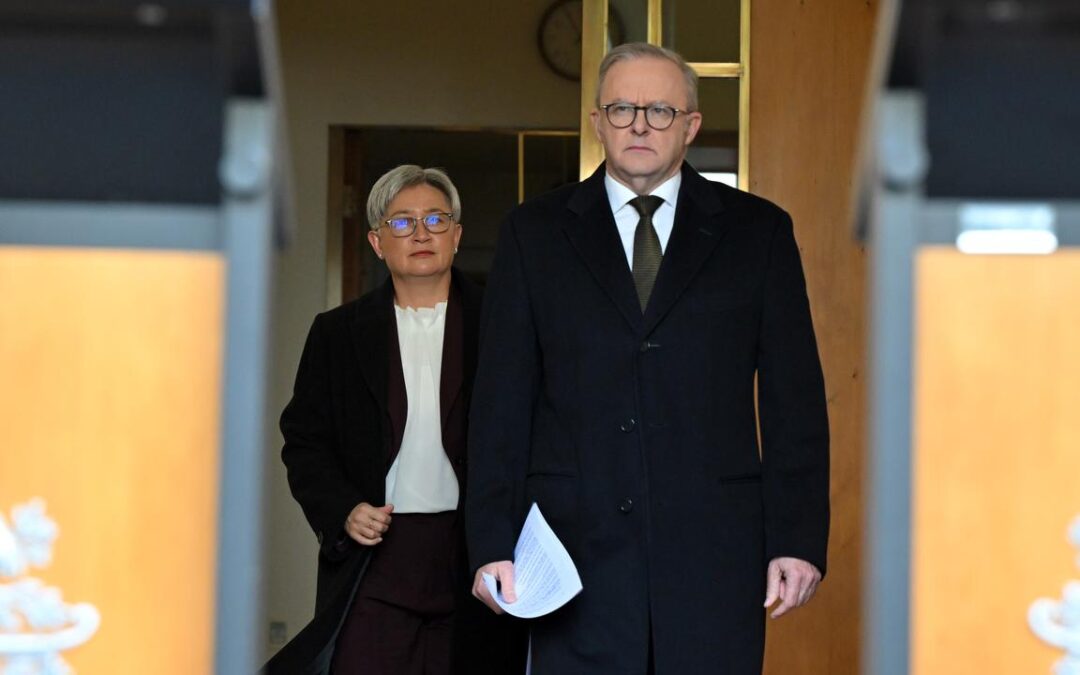
‘World cannot wait’: Australia to recognise Palestine
Australia will recognise the state of Palestine in a significant diplomatic step aimed at ending suffering and violence in Gaza.
Prime Minister Anthony Albanese has announced Australia will join allies such as France, the UK and Canada and recognise Palestinian statehood at the United Nations General Assembly meeting in September.
“Australia will recognise the right of the Palestinian people to a state of their own,” the prime minister told reporters in Canberra on Monday.
“A two-state solution is humanity’s best hope to break the cycle of violence in the Middle East and to bring an end to the conflict, suffering and starvation in Gaza.”
The prime minister said Palestinian recognition was part of international efforts to resolve the conflict in the Middle East.
Any recognition would need to guarantee that the designated terror group Hamas, which de facto governs Gaza, played no role in its future government, the prime minister said.
Mr Albanese, who said the situation in Gaza had gone “beyond the world’s worst fears, also revealed he spoke on Thursday to Israeli Prime Minister Benjamin Netanyahu and advocated for a political solution to the conflict.
The federal government has been under increasing pressure to do more on the Middle East as more than two million Palestinians face high levels of acute food insecurity, according to UN projections.
At least 90,000 protesters marched across the Sydney Harbour Bridge in early August, alongside thousands more in other Australian capitals, urging the government to sanction Israel.
The prime minister acknowledged the international community had to act.
“This is about much more than drawing a line on a map. This is about delivering a lifeline to the people of Gaza,” he said.
“The toll of the status quo is growing by the day, and it can be measured in innocent lives.
“The world cannot wait for success to be guaranteed.”

But Palestinian recognition could be used as a “veneer” that allows Israel to “continue brutalising Palestinians with no consequences”, Australia Palestine Advocacy Network’s president Nasser Mashni warned.
“What I want today is for Palestinians not to be slaughtered, what I want as an Australian is our government not to be complicit in that slaughter … for Palestinians like myself to have the opportunity to enact our inalienable right to return,” he told reporters in Melbourne.
“What happens after that will be upon the Palestinian people.
“It’s not my job, or Anthony Albanese’s to determine how Palestinians might seek their self-determination.”
The Australia/Israel and Jewish Affairs Council has condemned the government’s decision.
“Recognition by Western countries telegraphs to Hamas that its rejection of multiple ceasefire proposals over the past 12 months were the correct decision,” the council said in a statement.
Israel’s ambassador in Australia Amir Maimon said recognition has been taken for “symbolic reasons rather than genuine progress toward peace”.
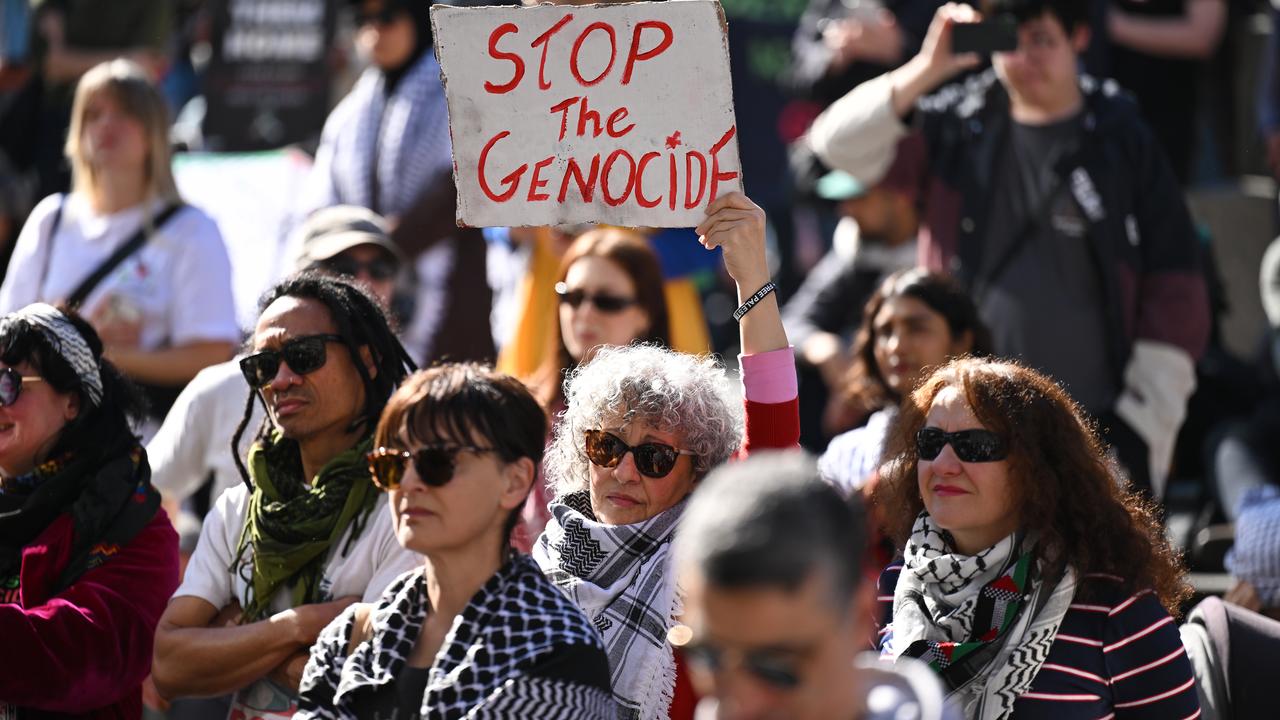
Opposition Leader Sussan Ley and coalition foreign affairs spokeswoman Michaelia Cash have also taken issue with recognition.
They warned it “risks delivering Hamas one of its strategic objectives” and puts Australia at odds with the US, which is “our most important ally and the most consequential player in the conflict in Gaza”.
Foreign Minister Penny Wong confirmed she spoke with US Secretary of State Marco Rubio about Australia’s intention to recognise Palestine before the decision was formally announced.
Australia has broken from the US in previous UN votes on issues regarding Palestine.
Greens senator David Shoebridge said the recognition was overdue, but should also include sanctions on Israel.

The crisis in Gaza began when Hamas attacked Israel on October 7, 2023, killing 1200 people and taking about 250 more hostage.
Israel’s military response has since killed more than 61,000 people, according to Gaza’s health authorities.
Israel has denied that the population is suffering or dying from starvation even though it has throttled the flow of aid to Gaza for months, international human rights groups have said.
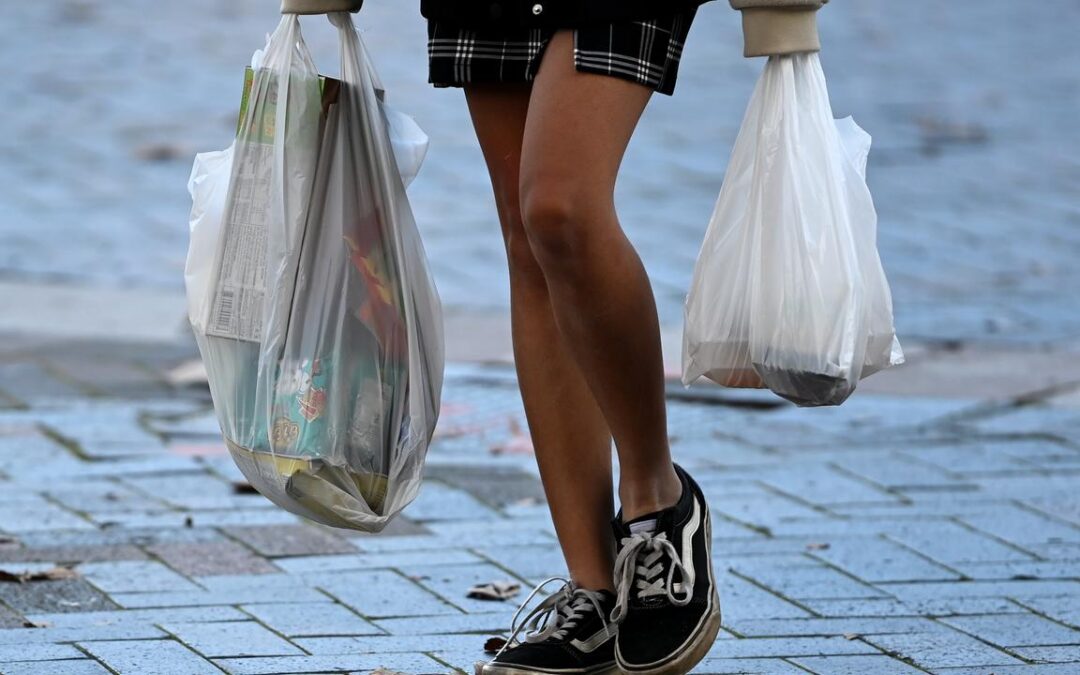
Rebooted plastic scheme could hike groceries cost
Plastic-wrapped chocolate bars, two-minute noodles and breakfast cereals could all become more expensive under an Australia-wide recycling scheme likely to win approval.
The competition watchdog on Monday signalled it wanted to green-light the creation of a voluntary, industry-led scheme to collect and recycle soft plastic packaging from consumers.
Backed by major supermarkets and food giants Mars and Nestle, the scheme would succeed REDcycle, which collapsed in 2022 with an estimated 11,000 tonnes of stockpiled soft plastic strewn across dozens of depots.
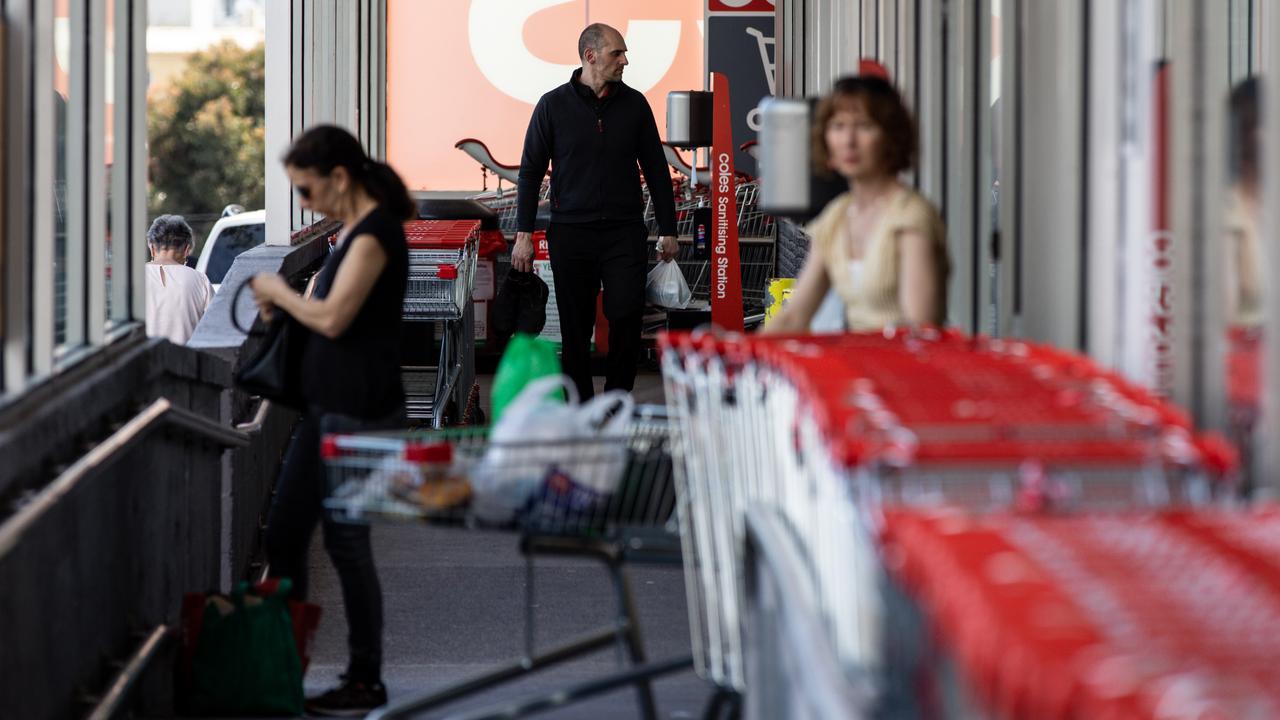
The new operation would be funded through a soft plastic packaging levy that could be passed on to consumers.
It was “an important stepping stone to expanding collections and recycling”, the Australian Competition and Consumer Commission said.
More than 500,000 tonnes of soft plastic packaging is used by manufacturers in packaging their products every year, with little of that recycled, according to industry figures.
“It is clear that many Australians are concerned about the environmental impacts of soft plastic packaging and want to recycle it,” ACCC deputy chair Mick Keogh said on Monday.
“We believe the proposed scheme will result in an environmental benefit as it aims to take over and expand the current in-store collection and kerbside pilots for recycling soft plastic packaging, meaning some soft plastics are likely to be diverted from landfill.”
The scheme and levy would be operated by Soft Plastics Stewardship Australia, initially made up of Nestle, Mars and McCormick Foods alongside Woolworths, Coles and Aldi.
The levy would be collected on scheme participants based on how much business-to-consumer soft plastic packaging they put on the market.
For example, a manufacturer selling a product to a supermarket is considered to have placed it on the market.
About 70 per cent of soft plastic packaging is business-to-consumer.
Submissions on the competition watchdog’s draft determination to approve the scheme are due in two weeks.
It follows the quiet resumption of soft plastics recycling in supermarkets in recent months.
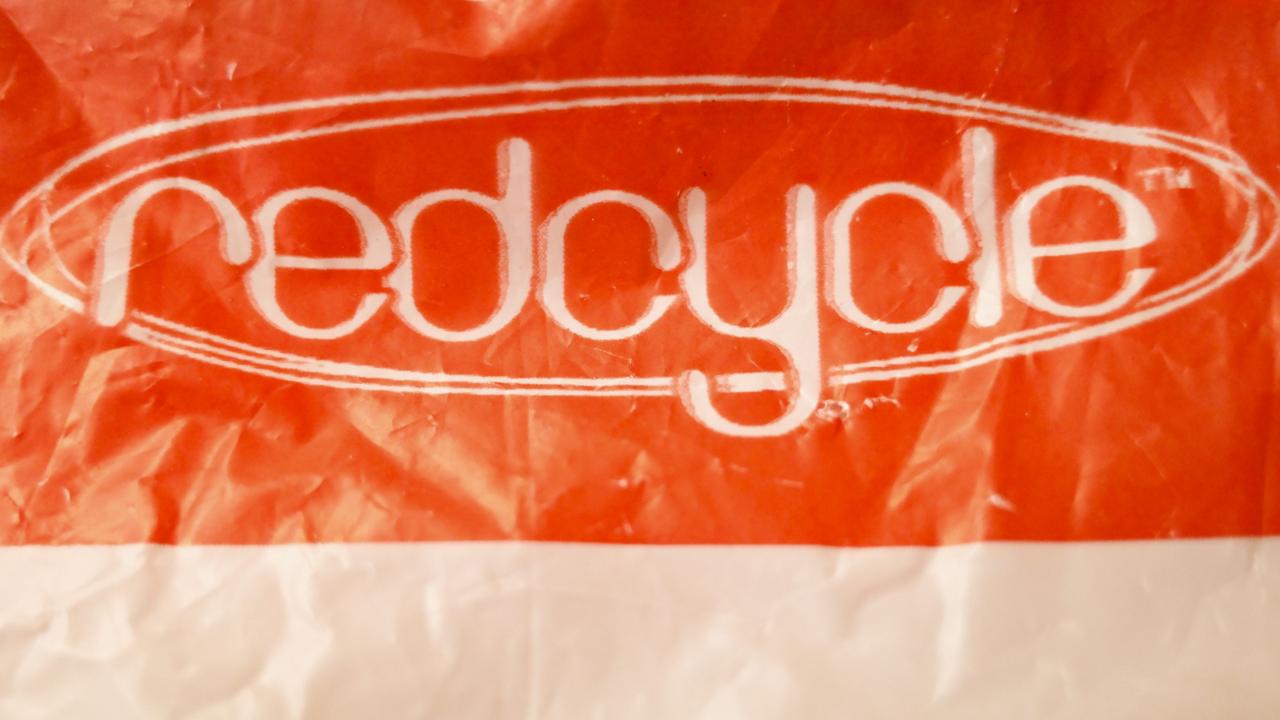
Aldi and Woolworths have both attributed the slow uptake in that scheme to a lack of publicity.
The spectacular collapse of the for-profit REDcycle in late 2022 led to the startling revelation soft plastics that consumers had been dutifully returning to supermarkets had been secretly stockpiled at warehouses across the nation.
Supply-chain issues, the COVID-19 pandemic and insufficient demand for the products REDcycle produced from melted-down plastics were blamed for its failure.
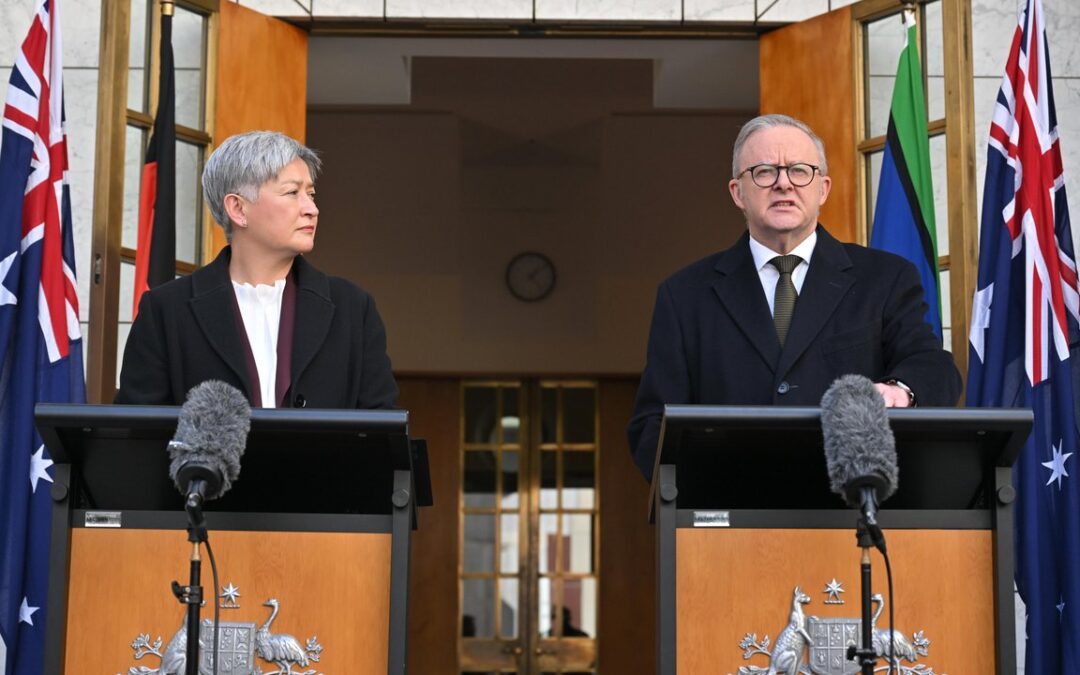
Palestine recognition will be a ‘lifeline for Gaza’: PM
Australia will recognise the state of Palestine in a historic move that will redefine the nation’s foreign policy.
After signalling a likely diplomatic shift, Prime Minister Anthony Albanese on Monday revealed his government will join France, the UK and Canada in recognising Palestine at a United Nations General Assembly meeting in September.
“Australia will recognise the right of the Palestinian people to a state of their own predicated on the commitments Australia has received from the Palestinian Authority,” Mr Albanese told reporters in Canberra.
“We will work with the international community to make this right a reality.”
More than 140 of 193 UN member states already recognise Palestine, including European Union member states Spain and Ireland.
Mr Albanese said the move to recognise Palestine was part of a coordinated global effort for a two-state solution in the Middle East.
“A two-state solution is humanity’s best hope to break the cycle of violence in the Middle East and to bring an end to the conflict, suffering and starvation in Gaza,” he said.
While Labor has long supported a two-state solution where Israel and Palestine peacefully co-exist, the federal government had previously been hesitant to commit to a timeline on recognition.
But Mr Albanese has also recently said recognition was a matter of “when, not if”.
He’s also said any UN resolution on recognition would need to guarantee that the designated terror group Hamas, which de facto governs Gaza, played no role in its future government.
But as images of emaciated children have poured out of the Gaza Strip, the federal government has faced increasing pressure to do more.
At least 90,000 protesters marched across the Sydney Harbour Bridge in early August, alongside thousands more in other Australian capitals, urging the government to sanction Israel.
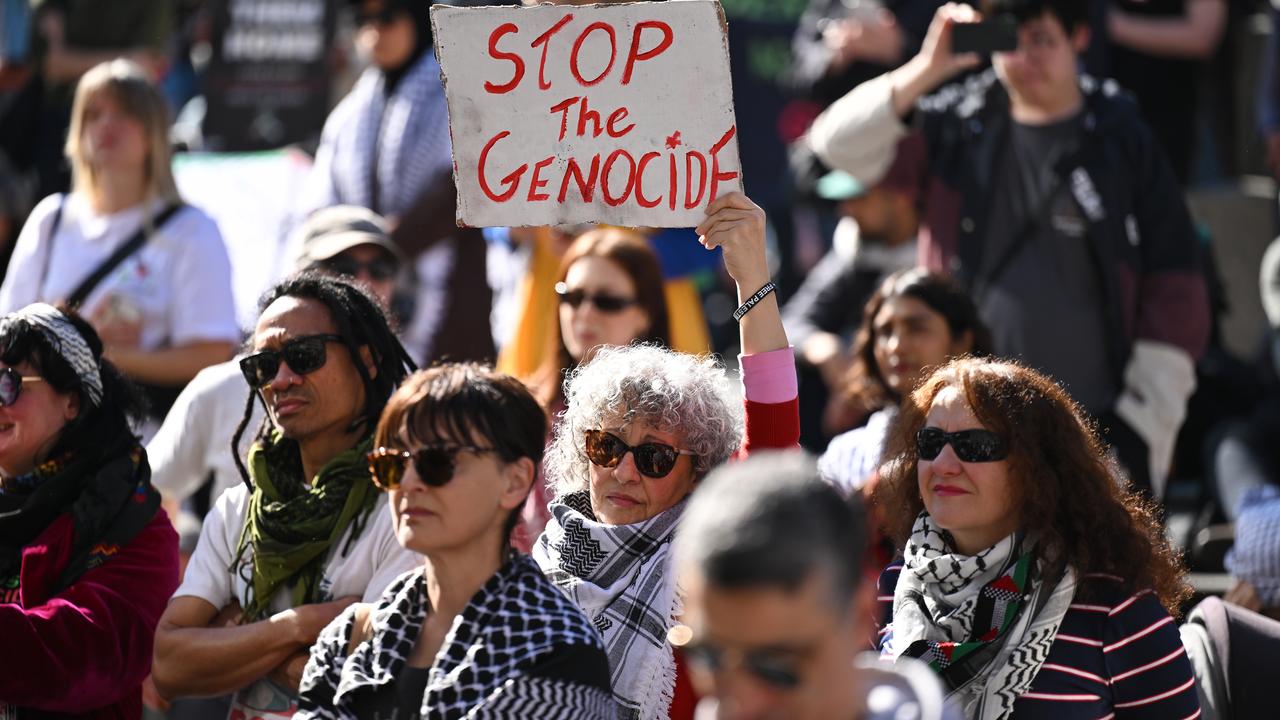
The prime minister said the international community had to act.
“This is about much more than drawing a line on a map. This is about delivering a lifeline to the people of Gaza,” he said.
“The toll of the status quo is growing by the day, and it can be measured in innocent lives. The world cannot wait for success to be guaranteed.”
“That only means waiting for a day that will never come. There is a moment of opportunity here, and Australia will work with the international community to seize it.”
Momentum for a Palestinian state has also swelled within Labor’s ranks, as MP Ed Husic and former Foreign Minister Bob Carr called for action.
And on Monday, the prime minister finally revealed Australia would be taking the diplomatic leap, days after Israel announced plans to occupy Gaza in a final push to drive out Hamas.
But Palestinian recognition could be used as a “veneer” that allows Israel to “continue brutalising Palestinians with no consequences”, Australia Palestine Advocacy Network’s president Nasser Mashni warned.
“This announcement of recognition is a cynical political smokescreen, an empty gesture designed to shield Australia’s economic, military and diplomatic ties, protect Israel and enable this rogue state to continue its deadly war crimes with impunity,” he said in a statement.
Ahead of the announcement, Israeli Prime Minister Benjamin Netanyahu also said the stances taken by Australia and other nations on Palestine were “shameful” and warned it would not create peace in the Middle East.
The crisis in Gaza began after Hamas attacked Israel on October 7, 2023, killing 1200 people and taking about 250 more hostage.
Israel’s response has since killed more than 61,000 people, according to Gaza’s health authorities, and UN sources project more than two million people are facing high levels of acute food insecurity.
Israel has denied that the population is suffering or dying from starvation despite international human rights groups condemning its offensive.
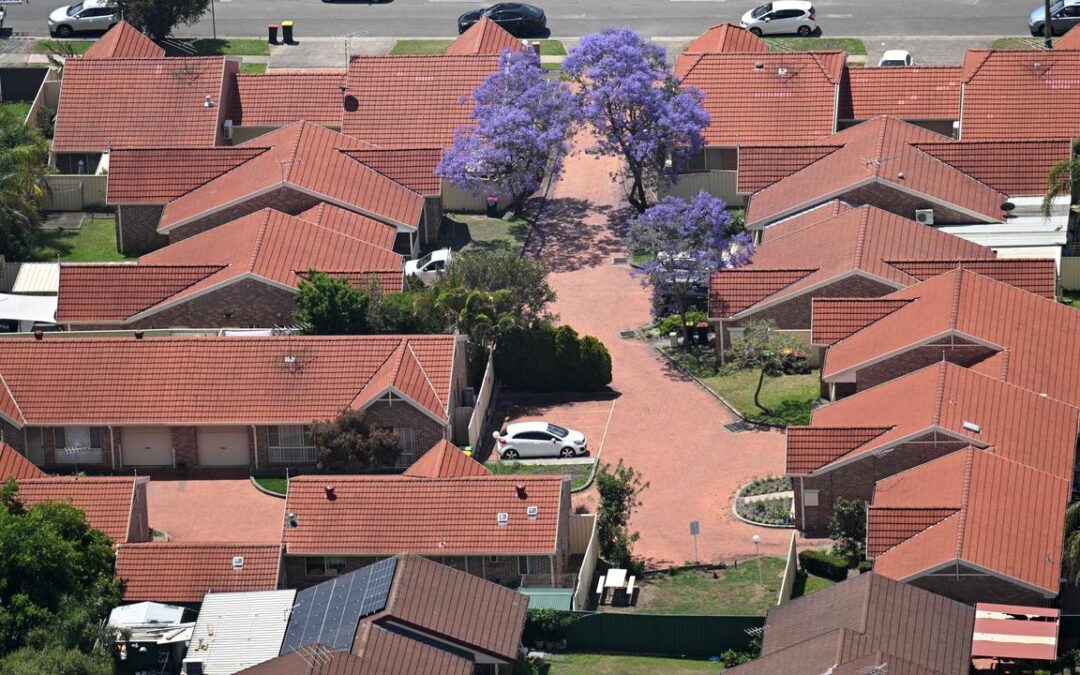
Hopes RBA won’t repeat shock rates hold as board meets
Markets are almost certain the Reserve Bank of Australia will cut interest rates at its August meeting despite the board facing an increasingly uncertain environment.
Benign quarterly inflation figures released by the Australian Bureau of Statistics in July should convince the board to cut the cash rate in a two-day meeting that starts on Monday, AMP deputy chief economist Diana Mousina said.
In fact, a cut of 25 basis points to 3.6 per cent should have happened already, Ms Mousina said.
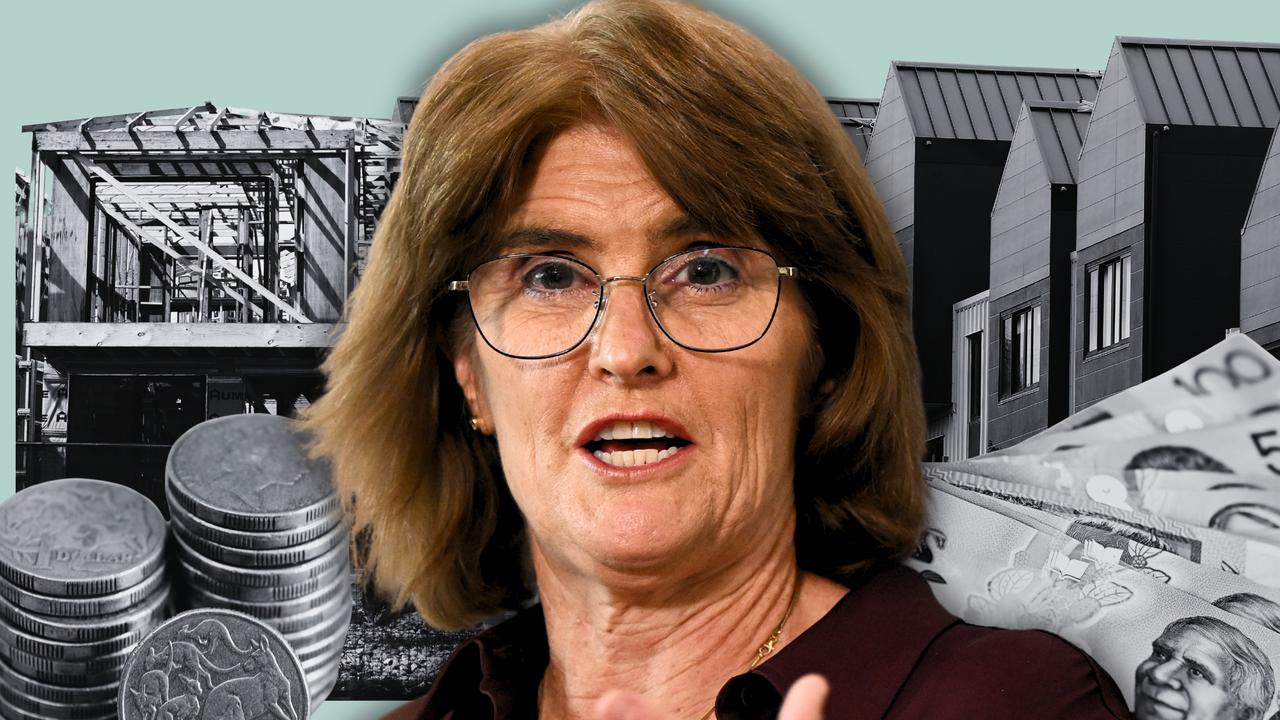
Mortgage holders will be hoping lighting doesn’t strike twice after the central bank’s board voted in a 6-3 decision to leave rates on hold in July, despite markets pricing in a near-certain chance of a cut.
The majority of economists also expect a cut this time around, including 31 out of 34 experts surveyed by comparison website Finder.
But with markets predicting another two cuts following this one, RBA governor Michele Bullock is likely to try to pare back expectations in her post-meeting communications after the meeting wraps up on Tuesday.
“We think that the RBA will still sound cautious on giving too much forward guidance and remain of the view that interest rates do not need to be aggressively cut for now, given their concern that upside inflation risks may occur again in Australia,” Ms Mousina said.
Another potential concern for Ms Bullock could be developments at the US central bank.
Ms Mousina said we could be seeing the “Trumpification” of the Federal Reserve after the US president’s appointment of ally Stephen Miran to replace departing governor Adriana Kugler.
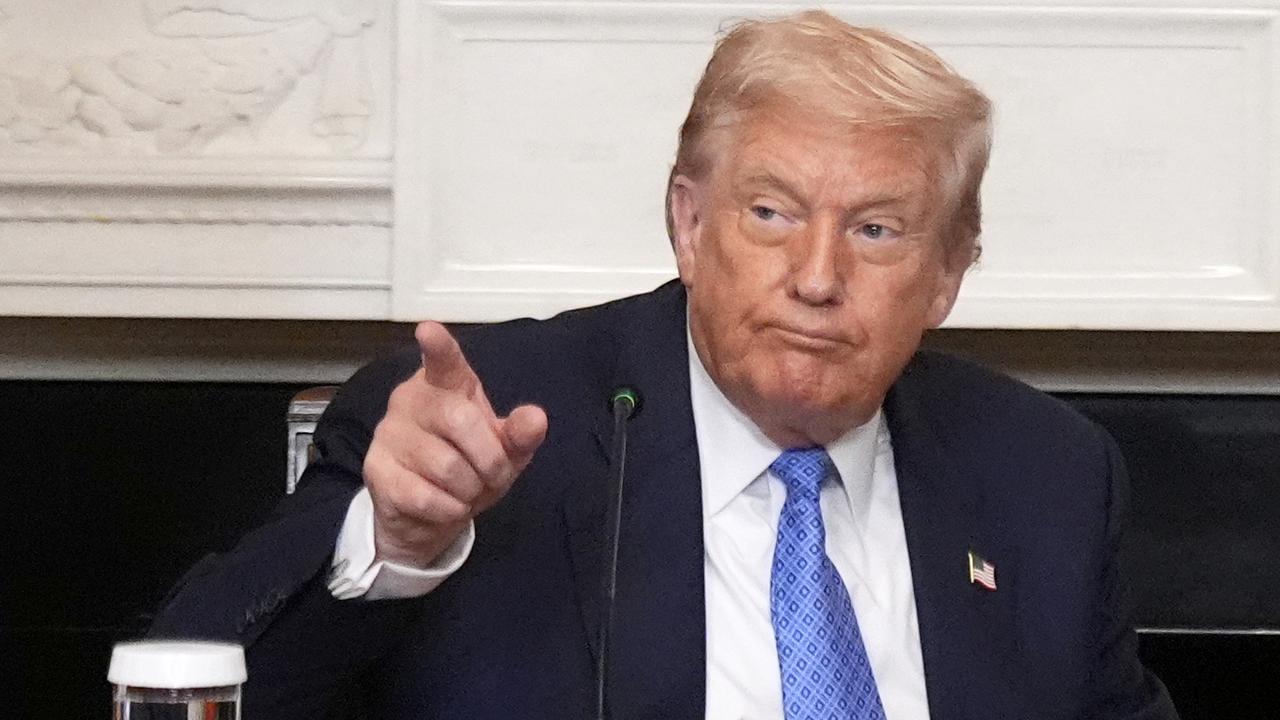
Mr Miran’s appointment heralds a more dovish Fed board, which could mean lower US interest rates if Donald Trump gets his way.
“Stephen Miran’s appointment to the Federal Reserve board will likely increase pressure for deeper rate cuts while broadening concerns around Fed independence,” JP Morgan chief economist Bruce Kasman said.
While the RBA has been more focused on domestic developments in recent months, the Fed’s outsized influence on global borrowing costs can set the tone for International monetary policy.
When the Fed cuts, central banks around the world have tended to follow.
And a dovish turn could have consequences for the Australian dollar, investor expectations and the broader economy.
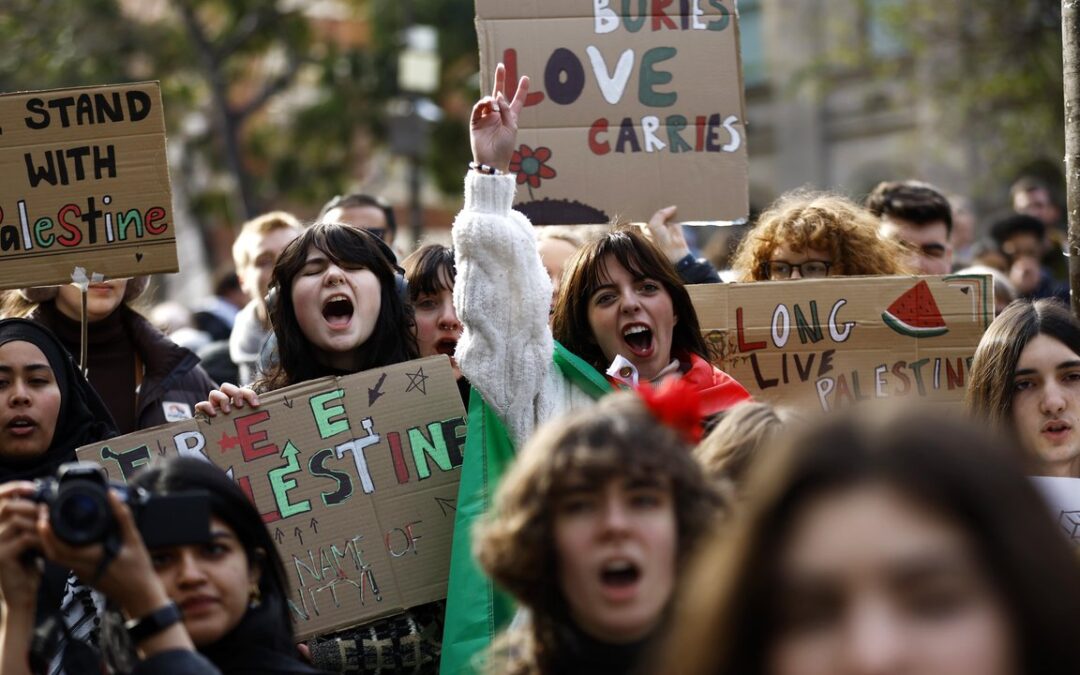
Australia edges closer to recognising Palestinian state
Australia appears to be gearing up to follow several major Western powers in recognising a Palestinian state at an upcoming United Nations meeting, a top international law expert says.
G7 nations France, the UK and Canada have committed to recognising Palestine at the United Nations General Assembly in September amid growing pressure for Israel to end the war in Gaza.
Australia looks set to join them after a significant shift in rhetoric in recent weeks, Australian National University professor Donald Rothwell said.
“Everything at the moment is pointing towards Australia positioning itself to make an announcement of the recognition of Palestine by the time of the (meeting),” he told AAP.
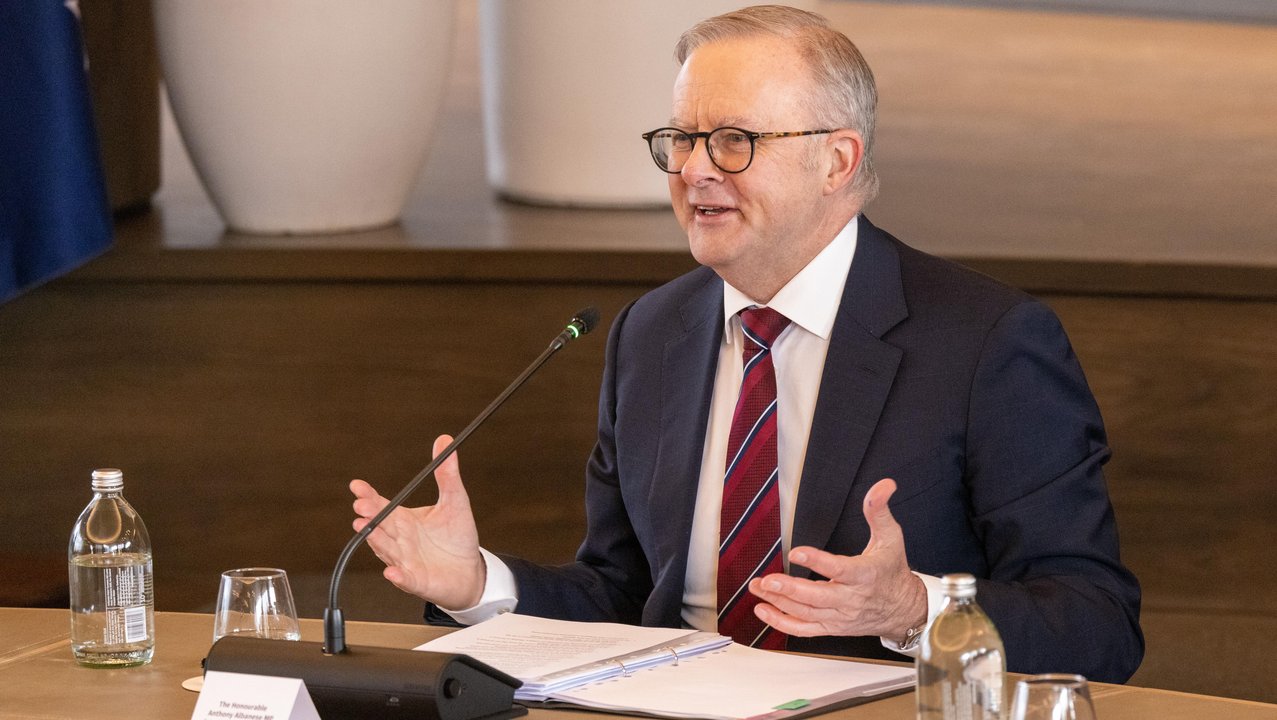
The Albanese government had been “softening” its position on recognising Palestine in the past two weeks, Prof Rothwell noted.
“The prime minister is also actually going to the United Nations General Assembly and it’s a very long time since the Australian prime minister has gone there,” he said.
“I’m sure that the prime minister is going there wanting to make an announcement of some significance and this will clearly be a significant announcement.”
Prof Rothwell also pointed to Foreign Minister Penny Wong’s recent stark comments about the humanitarian situation in Gaza and Israel’s plan to occupy the territory.
“The two-state solution is really just slipping away as a result of Israel’s campaign, and Australia doesn’t want to lose that opportunity,” he said.
In a joint statement with several other nations on Saturday, Senator Wong said the countries were committed to implementing a two-state solution to ensure peace for the Israeli and Palestinian people.
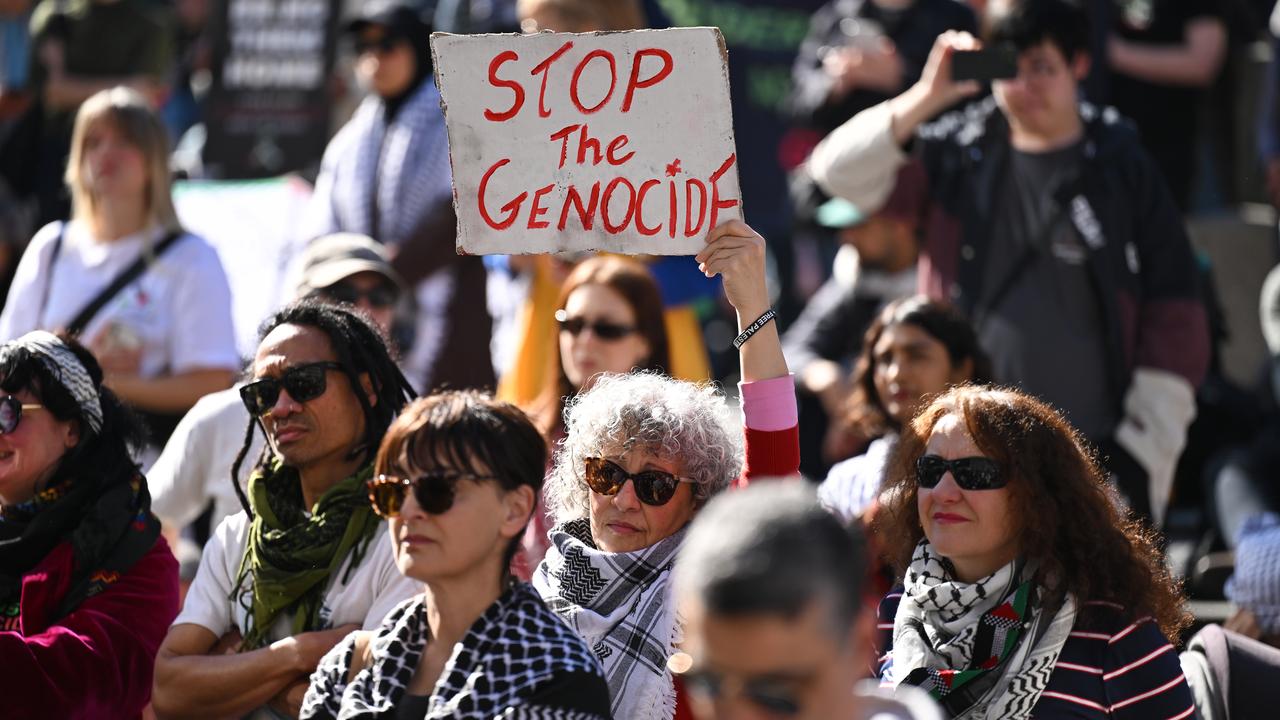
“A political resolution based on a negotiated two-state solution requires the total demilitarisation of Hamas and its complete exclusion from any form of governance in the Gaza Strip, where the Palestinian Authority must have a central role,” the statement said.
Home Affairs Minister Tony Burke appeared on Sunday to soften the government’s stance on the future role of Hamas, a listed terrorist organisation in Australia, in a Palestinian state.
He noted terrorist forces had occupied other countries that Australia continued to recognise, citing Syria and Iraq as examples.
Prof Rothwell said Syria and Iraq were different from Palestine because Australia had recognised them long before ISIS emerged and took control of large parts.
“The minister is making the point … at some point in time, Hamas might play a role in that Palestinian state but that would not see Australia revisit its recognition,” he said.
Mr Burke might also have been signalling further nuance in Australia’s developing position – that it might be prepared to move towards recognition of Palestine while Hamas continued to have a role in Gaza, Prof Rothwell said.
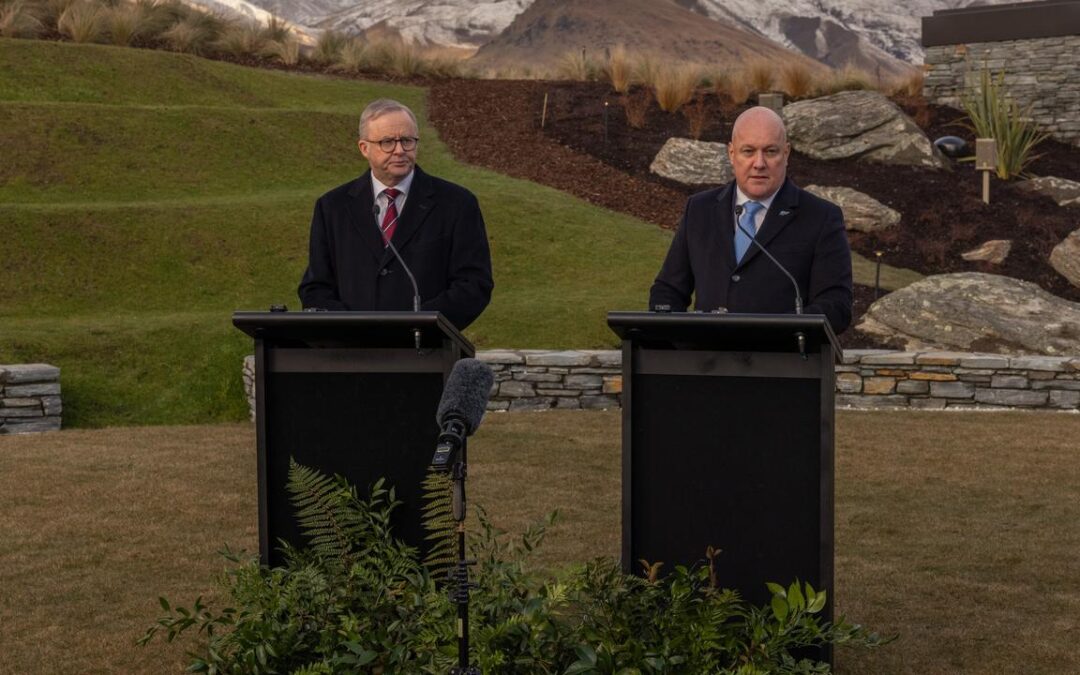
‘Great friends’ Australia, NZ vow closer defence ties
China’s assertiveness is pushing Australia and New Zealand’s militaries ever-closer, with the Kiwi leader declaring the nation’s defence forces should become as “interoperable as possible”.
Australian Prime Minister Anthony Albanese and his New Zealand counterpart Christopher Luxon ended a warm weekend together in the cold, atop a glacier near the South Island ski resort town of Queenstown on Sunday.
The pair traded some friendly banter about which country could lay claim to the invention of the pavlova at the end of their annual leaders’ meeting.
But in a gesture of peace, Mr Luxon met his trans-Tasman partner halfway, offering a dessert with one side adorned with kiwifruit while the other was generously topped with Tim-Tams.
“We have solved a centuries-old debate,” the New Zealand prime minister said in a video posted to social media featuring the sweet treat.
Despite sitting on opposing sides of the left-right political divide, the interaction showed the close personal relationship between Mr Luxon and Mr Albanese.
The pair developed a friendship when the former worked as an Air New Zealand chief executive while the now-Australian prime minister served as transport minister.
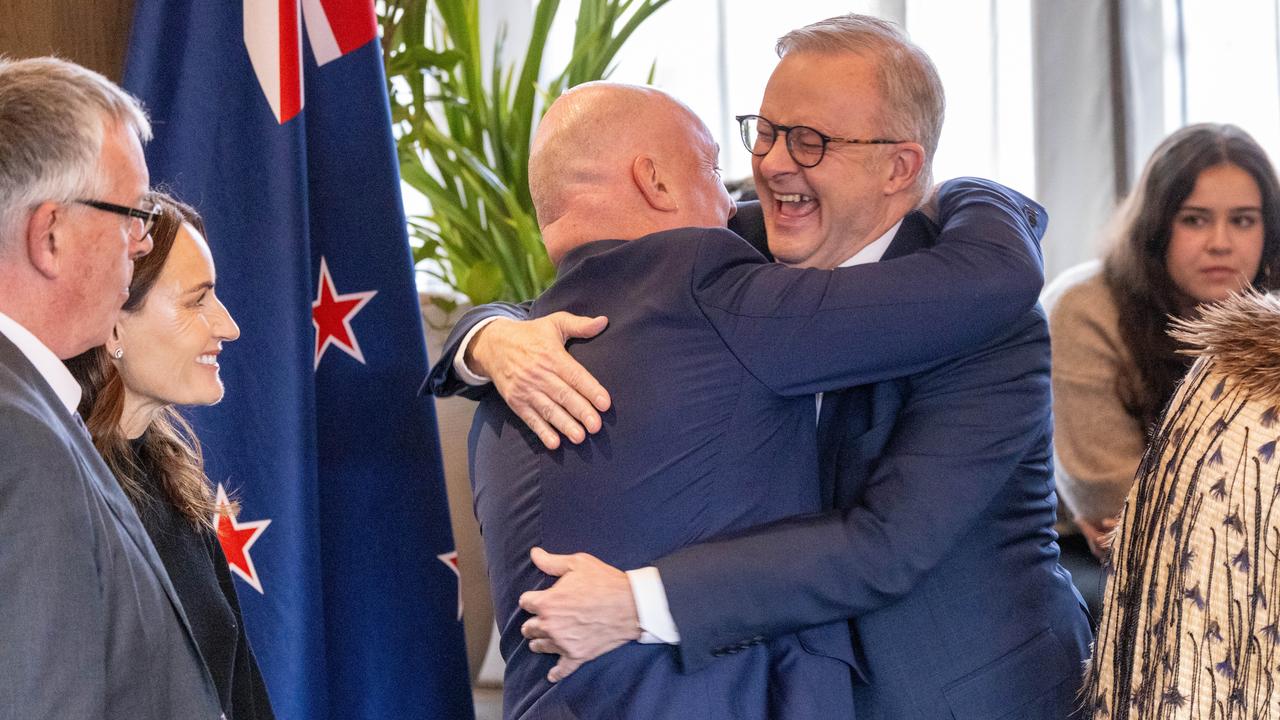
Earlier on Sunday, the leaders visited an Anzac memorial at the nearby town of Arrowtown and laid wreaths to commemorate soldiers from both countries fallen side-by-side in joint battle.
“When Australians think of New Zealand, we think of the Anzacs and we think of the sacrifice that we’ve made together in defence of our freedom,” Mr Albanese told reporters.
“Australia and New Zealand are great friends. We think alike and we act alike on the international stage.”
Mr Albanese and Mr Luxon vowed to further integrate the two nations’ economies as the regional partners face the “most unpredictable and dangerous” strategic environment in decades.
New Zealand has in recent decades sought to maintain a more independent foreign policy to Australia, retreating from the ANZUS alliance in the 1980s after banning US nuclear-powered submarines from its ports.
But since the election of the conservative Mr Luxon in 2023 and amid increasing Chinese military assertiveness in the Pacific, the tone has shifted.
Mr Luxon has spoken positively of Australia acquiring nuclear submarines through the AUKUS pact and on Sunday he floated the possibility of piggy-backing onto Australia’s deal to acquire 10 frigates from Japan, further increasing interoperability between the two nations’ militaries.
New Zealand’s upcoming bid to replace its naval helicopter fleet was another example where it could co-ordinate its military hardware with Australia.
“We want to make sure that they’re as interoperable as possible with the Australians when we go to market,” Mr Luxon said.

“We actually want to present joint procurement bids for those things that we can tap on the New Zealand requirements, and as a result, lower the collective cost for each of those individual items for each country.”
The move to tie New Zealand defence forces closely to those of Australia and allies like the US has been criticised as threatening its independent foreign policy, including by former longstanding Labour prime minister Helen Clark.
But University of Otago politics researcher Nicholas Khoo said strengthening military co-operation was appropriate given the increasing uncertainty in international politics.
“It’s an area where we could legitimately expect to see very real progress,” he told AAP.

Prof Khoo said the meeting showed the two neighbours’ “steady build-up” of co-operation, which didn’t exist until two years ago.
New Zealand only had one alliance-level partner in Australia and the summit showed its investment in that relationship, he said.
Co-operation was also seen as a way to help both countries achieve their goals of boosting economic productivity, including by renewing joint standards arrangements to streamline regulations in various sectors.
The pair spoke with business leaders on Saturday evening about removing regulatory pinchpoints to make it easier to operate across the two countries, Mr Luxon said.
“We want the barnacles off the boat, to go as quickly as we can for both countries that are trying to improve productivity,” he said.
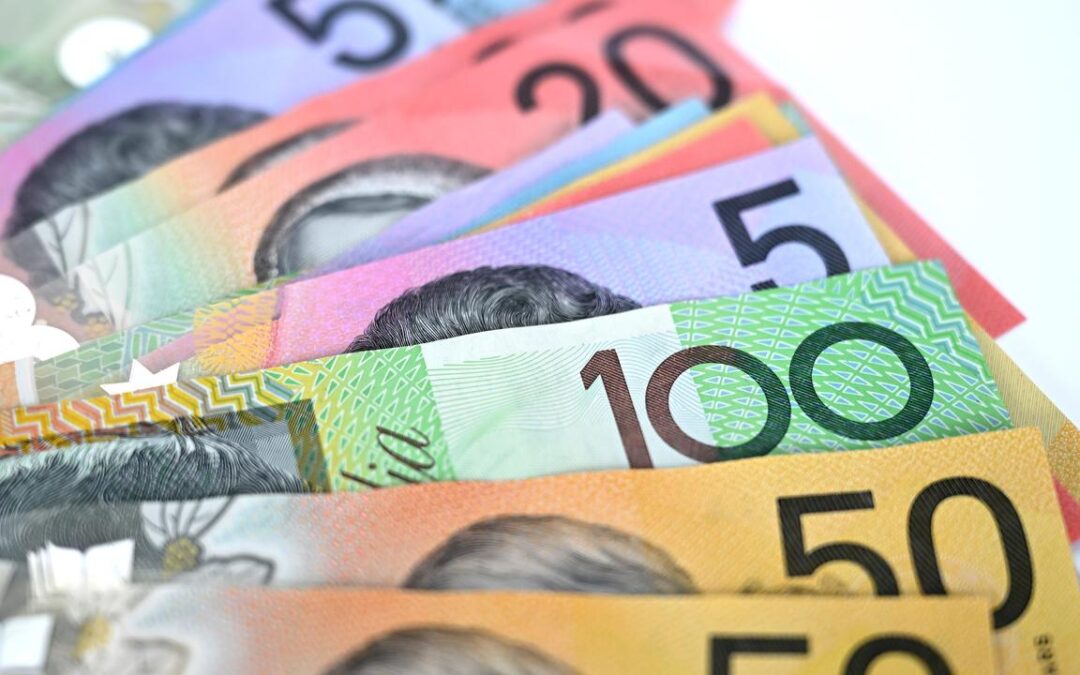
Mortgage holders ready for relief after past rates blow
Australia’s central bank appears set to offer mortgage holders some repayment relief a month on from its shock decision to keep interest rates on hold.
The Reserve Bank of Australia board, which meets on Monday and Tuesday, is widely tipped to shave 25 basis points off the official cash rate, taking the figure to 3.6 per cent.
Each 25 basis point cut to interest rates shaves about $90 off monthly repayments on a $600,000 mortgage, assuming banks pass on the reduction in full.
The cash rate was last at 3.6 per cent in April 2023.
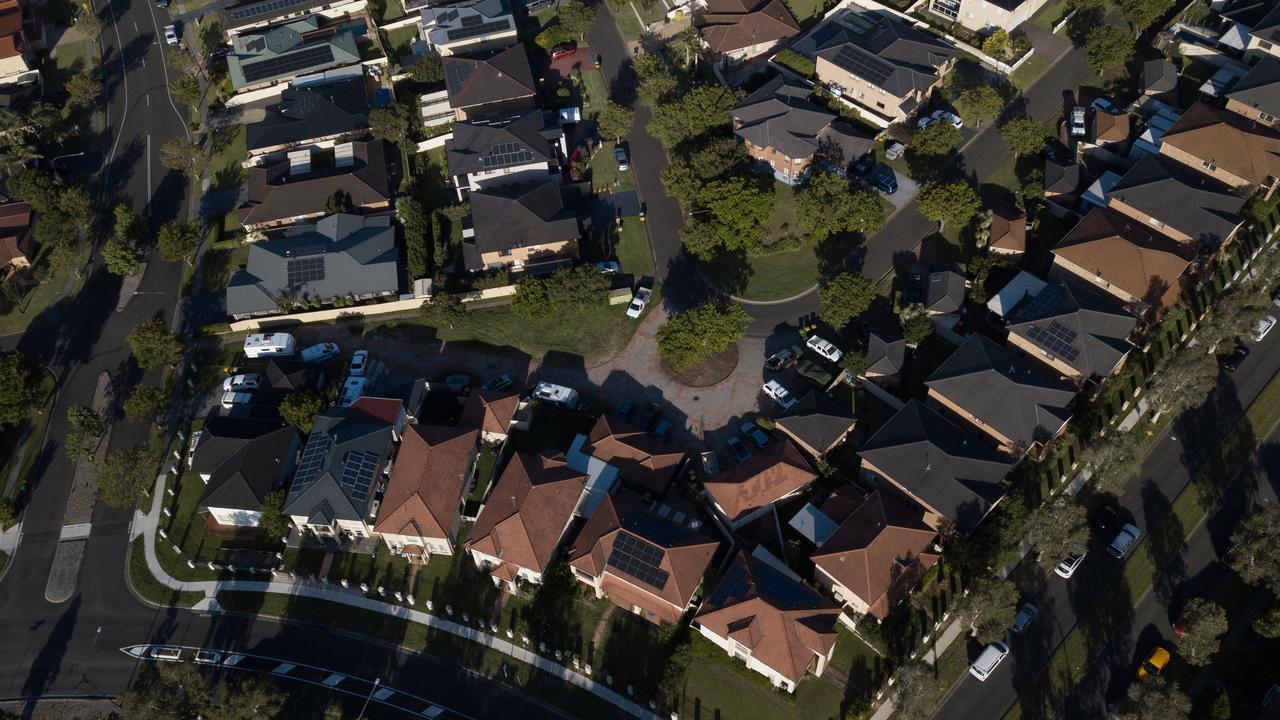
A surprise jump in unemployment combined with inflation data within the RBA’s target zone should make a cut on Tuesday almost inevitable, Westpac Group chief economist Luci Ellis said.
“Further cuts in November, February 2026 and May 2026 also look increasingly likely,” she said.
“We think this is at the lower end of what could be regarded as neutral, and would reflect the RBA’s response to a path for underlying inflation that turns out a little lower than what it forecast in May.”
In a move that caught analysts and many mortgage holders off-guard, the central bank in July kept the cash rate steady at 3.85 per cent.
Most economists had pencilled in a 25 basis point cut on the back of slowing inflation.
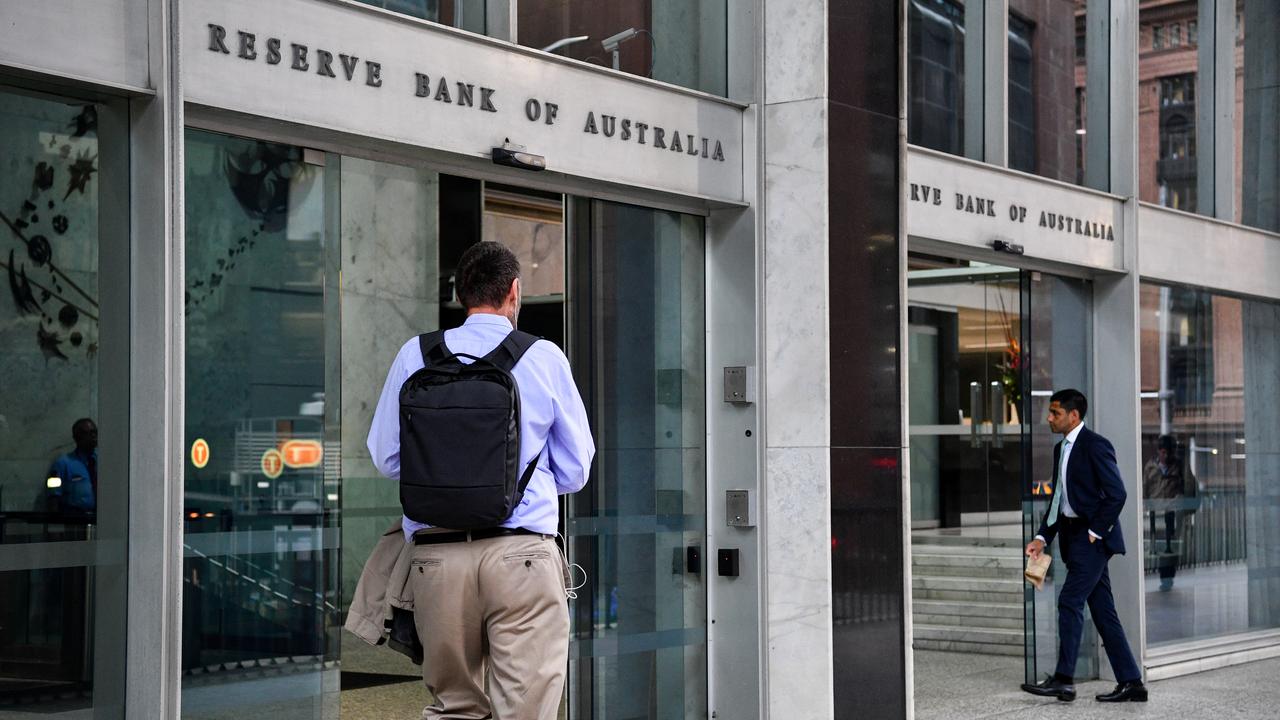
The RBA board said maintaining price stability and full employment was the priority.
“The board judged that it could wait for a little more information to confirm that inflation remains on track to reach 2.5 per cent on a sustainable basis,” the post-meeting statement read.
The latest quarterly inflation data showed the preferred figure of trimmed mean running at 2.7 per cent on an annual basis.
“That should be a pleasant surprise as the RBA had unofficially revised up its forecasts based on the April and May monthly CPI reports,” CreditorWatch chief economist Ivan Colhoun said.
“(We) expect the RBA board to vote unanimously to deliver another interest rate cut … this will be welcome news for both consumers and businesses alike.”
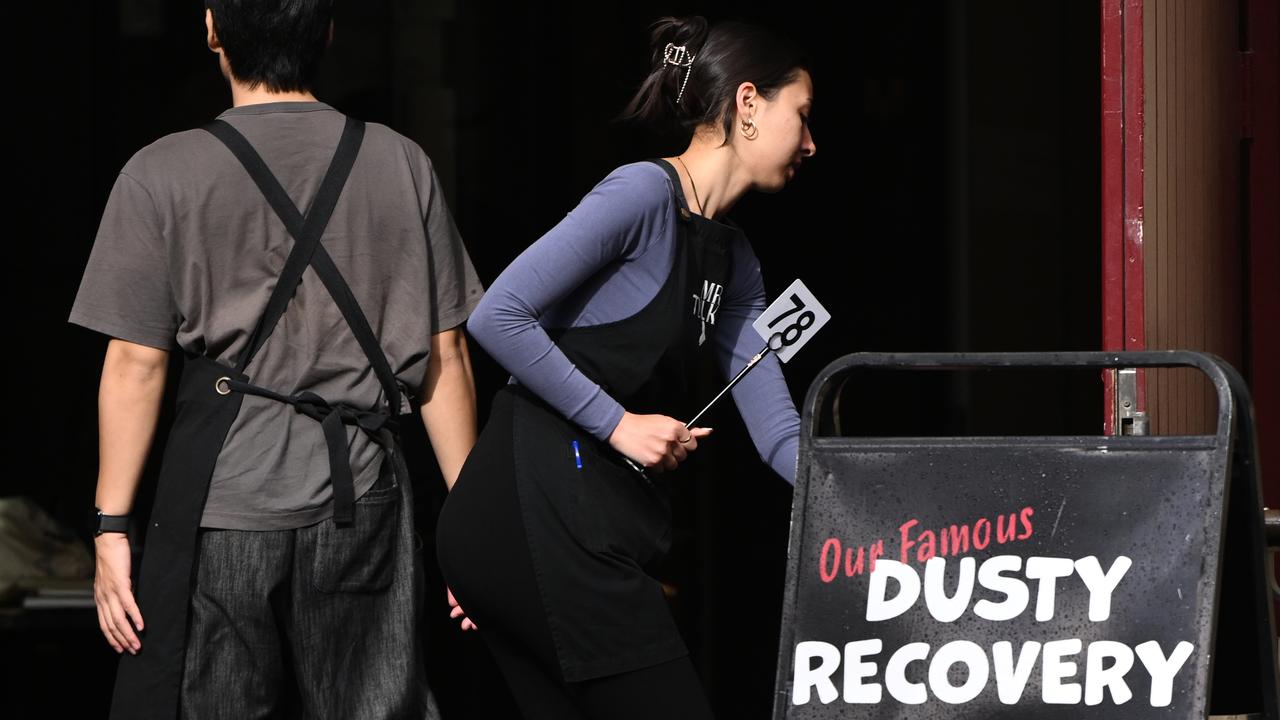
The jobless rate rose to 4.3 per cent, surpassing expectations, as the number of unemployed Australians jumped.
Financial markets expected the rate to remain steady at 4.1 per cent in June.
KPMG senior economist Terry Rawnsley said there was nothing in the various data points that should prevent a rate cut.
“Australia’s labour market remains resilient, despite signs of moderation, with unemployment at 4.3 per cent, its highest level since late 2021, but still historically low … this has been critical in helping households navigate the cost-of-living crisis,” he said.
“However, ongoing headwinds reinforce the need for interest rate cuts to sustain our labour market strength going forward.”
Interest rate markets have almost fully priced in a 25 basis point cut to the official cash rate at the August meeting and project a fall to 3.2 per cent by the end of 2025.
Meanwhile, US stocks ended the week up with the technology-heavy Nasdaq reaching a record high and all three major indexes logging gains.
Australian share futures lifted five points to be up 0.05 per cent, setting up a positive start to trading on Monday after a drop on local markets on Friday.
The benchmark S&P/ASX200 index ground 24.3 points lower, falling 0.28 per cent to 8.807.1, while the broader All Ordinaries fell 25.4 points, or 0.28 per cent, to 9,076.6.
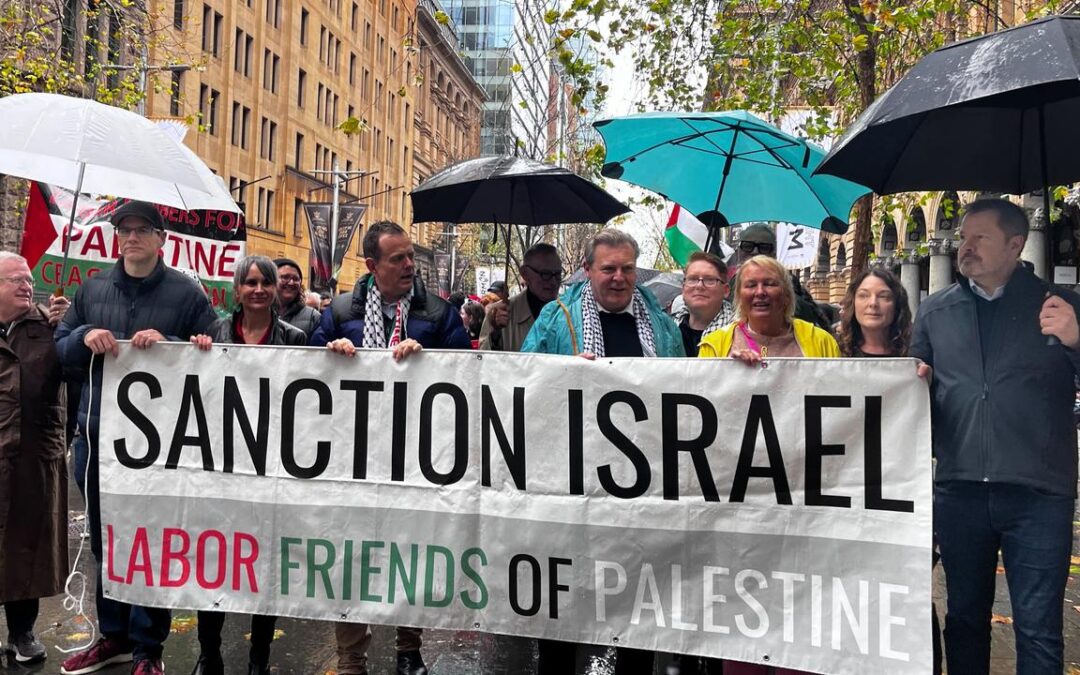
PM brushes off push for Israel sanctions as a ‘slogan’
The prime minister has brushed off calls to impose sanctions on Israel for blocking humanitarian aid from entering Gaza, calling the demands a “slogan”.
Speaking in the historic mining settlement of Arrowtown on New Zealand’s South Island, Anthony Albanese also repeated his government’s call for Israel to abandon its plan to occupy the entirety of the Gaza Strip.
“We called for an immediate ceasefire,” he told reporters on Sunday morning following a meeting with Kiwi counterpart Chris Luxon.
“We called for the release of hostages and we called for the unimpeded entry of aid into Gaza.
“We have a humanitarian catastrophe unfolding there. And the idea that it can just be continued is completely unacceptable.”
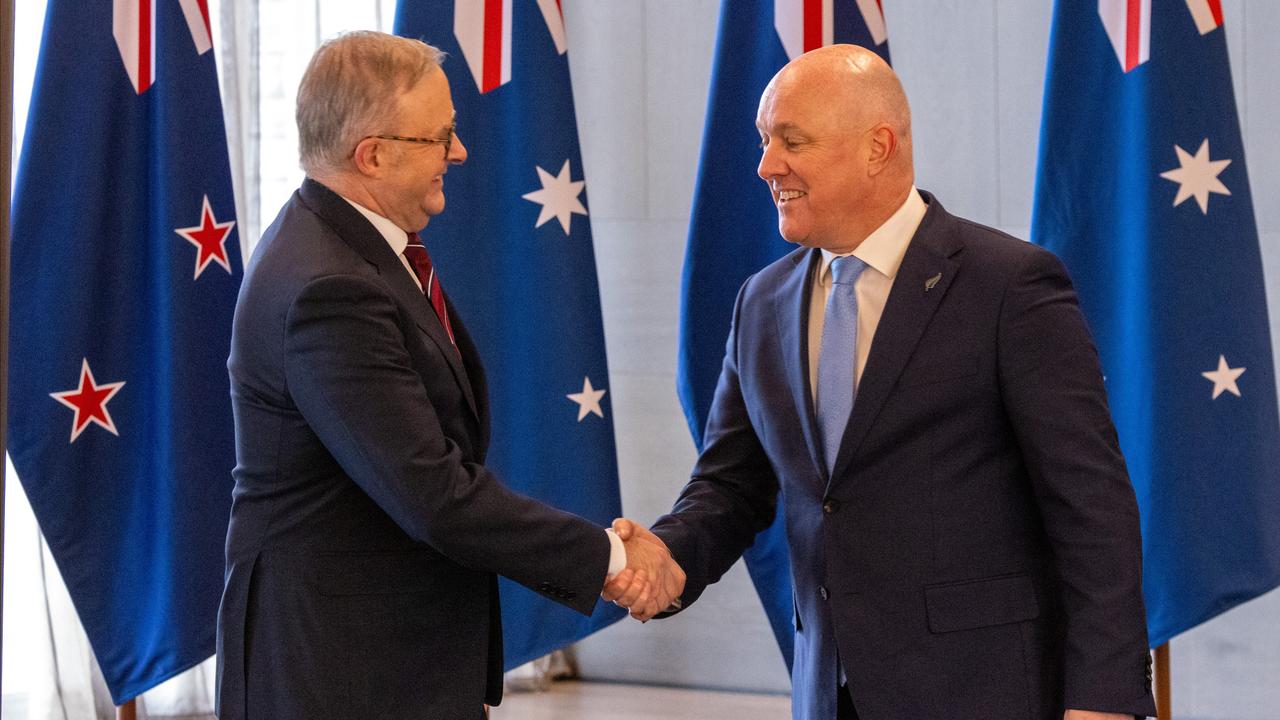
But the prime minister refused to answer a question about whether Australia would impose further sanctions on Israel as demanded by the Greens and other pro-Palestinian campaigners.
“What we need to do here is to have very clear statements and actions by the Australian government that make a difference, rather than respond to a slogan on a protest,” Mr Albanese said.
Australia previously imposed sanctions on Itamar Ben-Gvir and Bezalel Smotrich, two far-right Israeli ministers in Benjamin Netanyahu’s coalition government, who have been accused of inciting violence against Palestinians in the West Bank.
The prime minister has been gradually warming towards imminent recognition of a Palestinian state, discussing necessary steps with Palestinian Authority president Mahmoud Abbas in a recent phone call.
It followed announcements by France, the UK and Canada that they planned to recognise Palestinian statehood at the United Nations General Assembly in September.
US Secretary of State Marco Rubio has said efforts to progress recognition had encouraged Hamas, which sparked the deadly conflict with its October 7, 2023 attack on Israel, and scuttled peace talks.
But Deputy Prime Minister Richard Marles denied the claim.
“We have made clear that the actions of Hamas have actually undermined the prospects of there being a recognition of a Palestinian state, of the establishment of a two-state solution,” Mr Marles told ABC’s Insiders program.
“We have articulated, as we have discussed this question, that there can be no role for Hamas in a future Palestinian state.
“So there’s no encouragement to Hamas in any of the conversations that we have been having in relation to recognition.”
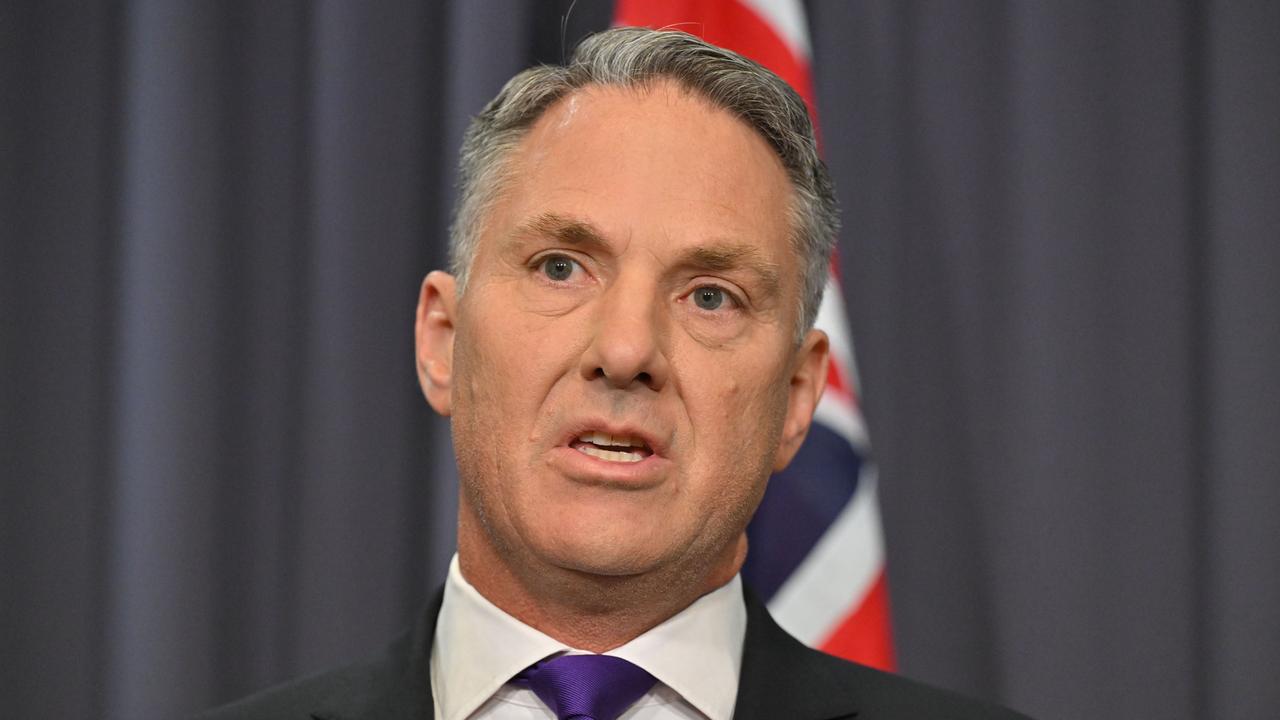
Opposition home affairs spokesman Andrew Hastie said he was hesitant to recognise the state of Palestine with Hamas, which is listed as a terrorist organisation by Australia, still in “prime position” to control Gaza.
“If they did move to elections, let’s just say that the Gaza conflict wound up and they moved to elections, what guarantee would there be that Hamas would not win another majority?” he told Sky News.
Home Affairs Minister Tony Burke said it would not be unprecedented for Australia to recognise a country while part of it was occupied by a terrorist organisation.
“There have frequently been countries where half of that nation has been occupied by a terrorist group and we haven’t ceased to recognise the country,” he said.
“Both Syria and Iraq had a long period where parts of those countries were being occupied and realistically controlled by ISIS.”
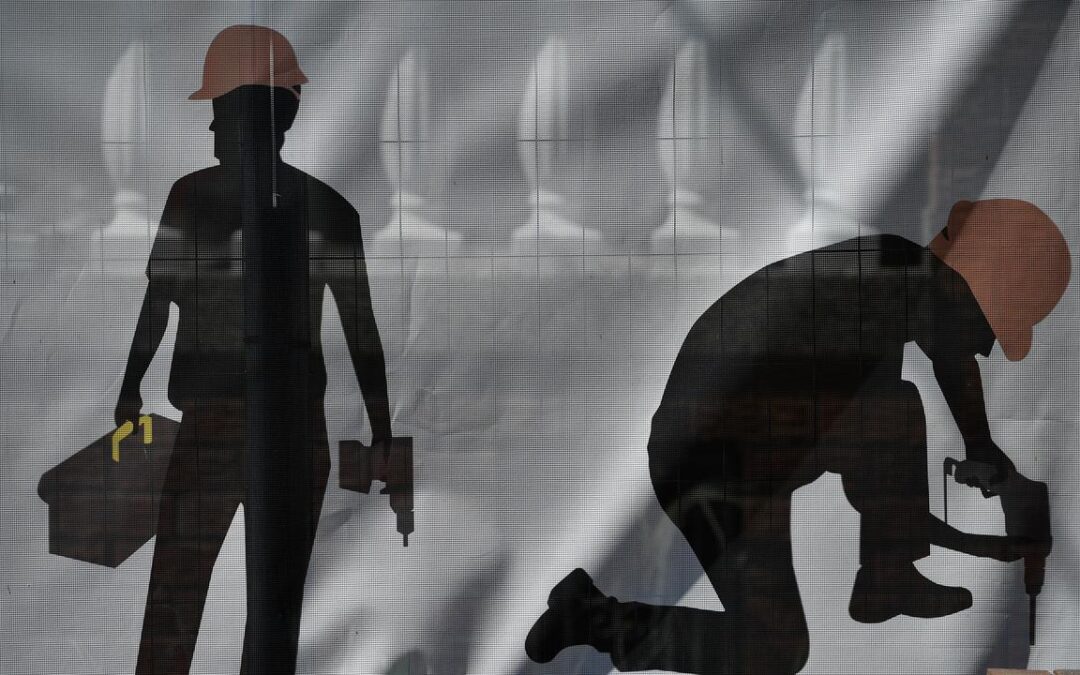
Don’t tough it out: tradies’ mental health in focus
Ben Pieyre has seen the language and actions around mental health transform during his two decades working in construction.
Not usually considered a “touchy-feely” industry, it took some time for mental health to become a priority in the male-dominated workplace.
While much has improved, people still fall through the cracks.
In 2024, an employee at Boom Logistics took his life, shaking the company to the core.
A second-generation employee, the bright young man had a good, secure job, a great circle of friends and was to be married within months, says Mr Pieyre, Boom’s CEO.

No one had any idea anything was awry – until it was too late.
“He was one of us,” Mr Pieyre tells AAP.
“These are small communities. Everybody knows each other, everybody’s related. It affects everyone, not only their family.
“When you look at it from the outside … nothing makes sense. And I think that’s the biggest trouble with mental health – it doesn’t make sense when you look at it from outside.”
Suicide remains the leading cause of death among Australian men aged 15 to 44 but the risk doubles in the construction industry.
Every second day, a tradie takes their life.
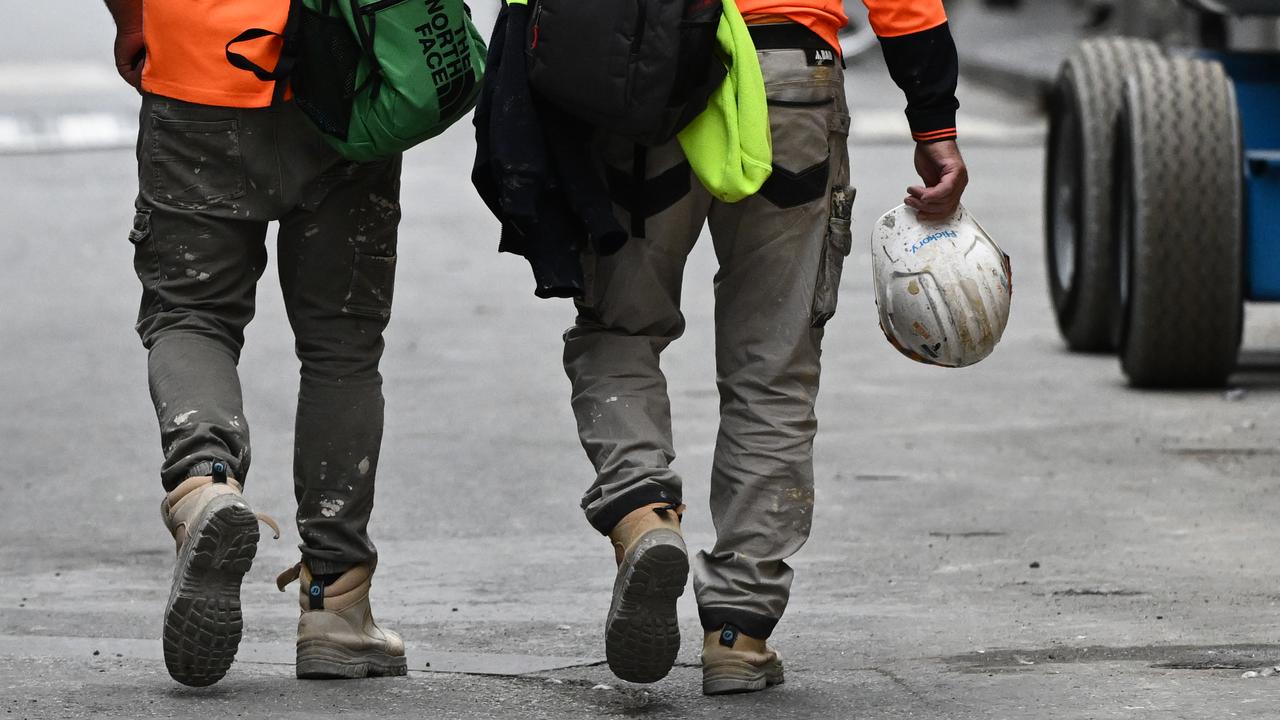
“It is a bit of a taboo for men to speak about and it’s probably not something men in this environment are quite comfortable or even open to even think about talking about,” Mr Pieyre says.
He has witnessed colleagues struggle with mental health issues but says “that’s something that we didn’t talk about 20 years ago”.
“But 15 years ago, we started to acknowledge it. Ten years ago, we started saying, ‘well, there’s a problem, we should do something’. Five years ago, we can see an improvement … however, it is still here,” he says.
“Men are stubborn and believe in some type of pride that we don’t talk about our feelings. There has been an improvement, but there’s obviously still a lot to do.”
Boom has partnered with Lifeline to help employees and managers tackle this crucial issue.
“There’s no X-ray for mental health problems, so the only thing we have is: we need to talk,” Mr Pieyre says.

“It’s not only the person that is being affected by mental health directly – it’s the person next to them. It’s giving the tools to people to recognise that change of behaviour or say ‘hey, mate, what’s going on – are you OK?'”
Lifeline Australia has launched a Strong Foundations toolkit for Tradies National Health Month, offering practical resources to build resilience and stay connected.
Lifeline chair Steve Moylan hopes making mental health support more accessible and relatable for all tradies will make a difference.
“In the construction trade, admitting you’re running on empty can feel like failure,” he tells AAP.
“But feeling stressed or burnt out are simply signs you’ve been carrying too much for too long.
“Treating these feelings as normal responses to tough conditions removes shame and makes it easier to ask for help.”

Recognising there might be a problem is the first step.
“Everyone faces tough days, and that’s normal, but when you’re running 12-hour shifts or are pulled off-site for weeks at a time, your body stays on high alert – your ‘go mode’ never switches off,” Professor Moylan says.
“That constant pressure wears you down, and without breaks with family or mates to reset, it can leave you feeling cut off. Recognising these common pressures is the first step to steadying yourself.”
Boom is using Lifeline messaging across company communications – from uniforms to equipment – to remind workers there is a voice on the end of the phone if they need to talk.
Mental wellness is just as important as wearing hard hats and steel toe boots on site, Prof Moylan says.
“When you look at safety, you can talk about safety or you can live and breathe safety. And this is the same approach that we’re taking here.”
Lifeline 13 11 14
beyondblue 1300 22 4636